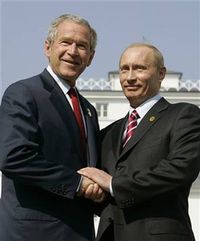
Hating him has become a national pastime. His party was pounded in the November midterm elections. For the rest of his term he will face a Congress filled with Republicans who are like rabid dogs in their personal hatred for him, and all he stands for.
In fact, history will record this as the year the tide turned, not only in President Obama’s favor, but in favor of the Obama Thesis of Consensus, which he represents.
The reason has to do with a history paper my own son wrote in high school. He chose to major in biology, but his 11th grade paper contrasted the foreign policy approaches of John F. Kennedy and Ronald Reagan relating to the Cold War and the Soviet Union. It was pretty good.
Kennedy talked soft power but used hard power, military force, both in Cuba and in Vietnam. Reagan talked hard power but actually used soft power, diplomacy and economics, jawboning the price of oil from nearly $50/barrel down to as low as $8.
The immediate result of what Kennedy did was Vietnam. Reagan got the collapse of the Soviet Union.

But what people remember about Reagan is that he “won the Cold War” and the collapse in oil, along with a collapse in gold prices, did indeed strangle the Communist Party and bring millions to freedom, or something like it. It cemented conservative dominance of U.S. politics for a generation.
Fast forward to our time. Obama talks the language of soft power, and while he’s used “hard power” in the form of drones he’s limited the use of boots on the ground.
Obama has played the long game. Obama pursued an “all of the above” energy strategy from the beginning of his term. That means he supported the Republicans’ “Drill Baby Drill” idea, which they proceeded to do with a vengeance. It also means he supported solar energy, wind energy, geothermal energy, biofuels, and the most important renewable energy of all – efficiency.

Despite five years of economic growth, meanwhile, demand for most forms of energy hasn’t gone up. Renewables have come into the grid, grid-scale batteries have become a thing, and the losses from brownouts and blackouts are starting to fall, a big win for the computing industry. By 2014, of course, the U.S. had become nearly self-sufficient in oil – it’s said that we’re now “continental independent” meaning North America produces as much of the stuff as it consumes.
This set the stage for the second part of Obama’s plan, which was to do precisely what Reagan did. He began jawboning down the oil price, helping Saudi Arabia in its political aims of gutting Iran and neutering ISIS. A lot of commentators in this country insist that the Saudis are engaged in a conspiracy against U.S. fracking, but that’s silly – as soon as the price of oil goes back to a reasonable profit someone (maybe not the same someone but someone) will be right back at it.
Who suffers from the oil glut and OPEC’s inability to get its act together? Let’s run down the list. Iran suffers, as noted. Venezuela suffers, and no one in Washington will miss the former Chavez dictatorship. Nigeria suffers, which should help disarm Boko Haram. Those within the Kingdom who support the Taliban suffer – the government can make up its losses from sovereign wealth but private individuals can’t.
Most of all, Russia suffers.

Then the price of oil started dropping. And it kept dropping. It dropped some more. Even more. At its recent price of $54/barrel, it’s at roughly half of where it was at in the summer. Putin has been talking big throughout, bigger as the crisis has gone on, but the oligarchs who maintain his power have been silent. They’ve been quietly backing off their more high-profile deals, like the ownership of sports franchises, and they’ve been hunkering down. You can hunker down at $80/barrel. At $55/barrel you’re past the hunkering down stage. Now the fortune they built is being taken apart, Putin is demanding they throw everything they have into the fire, at the point of a gun, and there’s no real return promised. What do they want with Donetsk?
So the pressure on Putin is building, and in 2015 it’s going to become unbearable. Putin either comes to the table or he gets taken out by the people who put him in.

Well, you may say, there’s also a “moderate” wing of the party, the money wing. But every wonder where the money gets its money? Wall Street. Hedge funds. Me-first guys who don’t care who they screw. Gordon Geckos. You know where these guys have been putting their money the last several years?
Oil. They’ve been leveraged to the hilt in oil and oil stocks. They’ve been making money hand over fist at it too. And now they’ve got their naughty bits caught in the trap. Every day the price of oil comes down they get margin calls. They have to sell stuff. They can’t believe this is happening – they think it’s an economic event rather than political revenge – and so they throw their assets on the fire. The stock market goes down. Everyone thinks stock prices should be rising – isn’t cheap oil the equivalent of a tax cut?
It’s fun to watch. The “solutions” their political minions propose – abandoning all support to renewable energy – are short-term fixes that don’t work in the long run, because the cost of renewables keeps coming down. The next generation of solar gear will produce energy for less than anything you can presently do on the grid. It just needs to be financed and put into production, and since that doesn’t depend at all on government largesse it’s going to be funded.

So let’s drink a toast to 2014. It looks, from up close, to have been a terrible year. But it has, in fact, been a major historical turning point. It has much in common with 1974, which seemed to be a triumph for the Left but actually set in motion a generation of conservative victories.

But we do need you. If you create the cloud, if you create new energy, if you can manipulate
a genome, if you can use those computers to do things that can’t even be imagined right now, we need you desperately.
And, chances are, since you’re an educated person, since you’re probably a young person, since you’ve lived through the horrors of Iraq and the Great Recession that followed the Big Shitpile, you’re a Democrat. All we need do is get you to act on your inclination, on your desire for consensus, for practicality. For Obama-ism.









